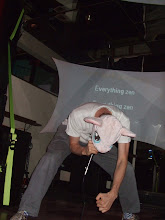
"You're standing in front of an abandoned house. The windows are broken, and you think you see shadows moving around inside. The wild howls. A shiver goes up your spine. It's all scary and enticing.
- If you...
- Go in through the window (turn to page 7)
- Go in through the door (turn to page 11)
- Go get help (turn to page 15).
I remember as a kid not being much impressed with the actual story. What fascinated me most, of course, was the format. The way it put you in the driver's seat. Before video games, this was one of the first forms of art I could interact with.
Anyway, I've been throwing ideas around in my head, and I think it would be sweet to write a choose-your-own-adventure. But do something a little different with it. Update the genre. Do something that adults would find interesting. Something socially-relevant would be a bonus.
Here are some of the ideas that came to mind.
- Tongue-in-cheek social commentary style So many things today are simulated forms of something else, i.e. Nintendo Wii sports, Rock Band, internet chat. Anyway, I think it would be an interesting joke's-on-you style ironic art piece to make a choose-your-own-adventure book where the only adventure that takes place is actually inside of another artificial game. For example, a choose-your-own-adventure that's actually a game of Dungeons and Dragons. And within the D&D world, you can watch a movie, or play Wii or Rock Band. Like nesting Russian Dolls, each choice you make brings you deeper and deeper into some artificial reality. Of course, this idea is smarmy and annoying. It would be tedious to write. Only good as a concept. However, with that said, I sometimes wonder about people who read books like Lord of the Rings or Harry Potter, or any of that stuff. In a way, isn't this just the analog version of a game of D&D or World of Warcraft? (Obviously, this question is stupid, because it's really the other way around.)
- Open-source collab style This iteration is based on the idea that each "chapter" of the adventure could be written by a different author. For this, I was partially inspired by Douglas Rushkoff's Exit Strategy in which he had strangers on the internet write the footnotes of his already-conceptually-dense novel. But my version is different in that every chapter would actually be written by a different person. You could do this "pyramid style": One person writes the first chapter, which branches into three options. So, the first author has to find three friends to write the next three chapters. Each of those people has to find a couple more friends to continue the story, and so on. (Of course, there would have to be guidelines set ahead of time, like broad limitations on word count and content; but those are just details.) Alternatively, this could be done totally open-source-style, like a wiki, where total strangers can go in and write or edit. At a certain point, though, there would have to be a head author who has final say.
- Fractal reality style In this iteration, the novel is written by multiple people like in the previous iteration, but the main difference is that instead of the novel following one character, you actually jump from character to character as the story progresses. The reader can choose what character to jump to at any given point in the story. The challenge would be to actually succeed in telling a cohesive story while jumping around from character to character. (It wouldn't be necessary, but there could be a sci-fi explanation of how these jumps are occurring; for example, "you" are actually a mind-virus that can jump hosts. When you're in one host, you see the world through their eyes, but when they sneeze, you actually jump to a new host.) The sweet thing about this approach is that you'd be able to "live" as many different characters: he who seemed reprehensible from one character's perspective, might turn out to be understandable when you see the world through his eyes.
And even sweeter turn on this same idea: have each new character written by an author who is similar to them. For example, the policeman character could be written by an actual policeman. The teacher, by an actual teacher. The child, by an actual child. The authors would be essentially writing about themselves; what they would do if they were part of this story.
